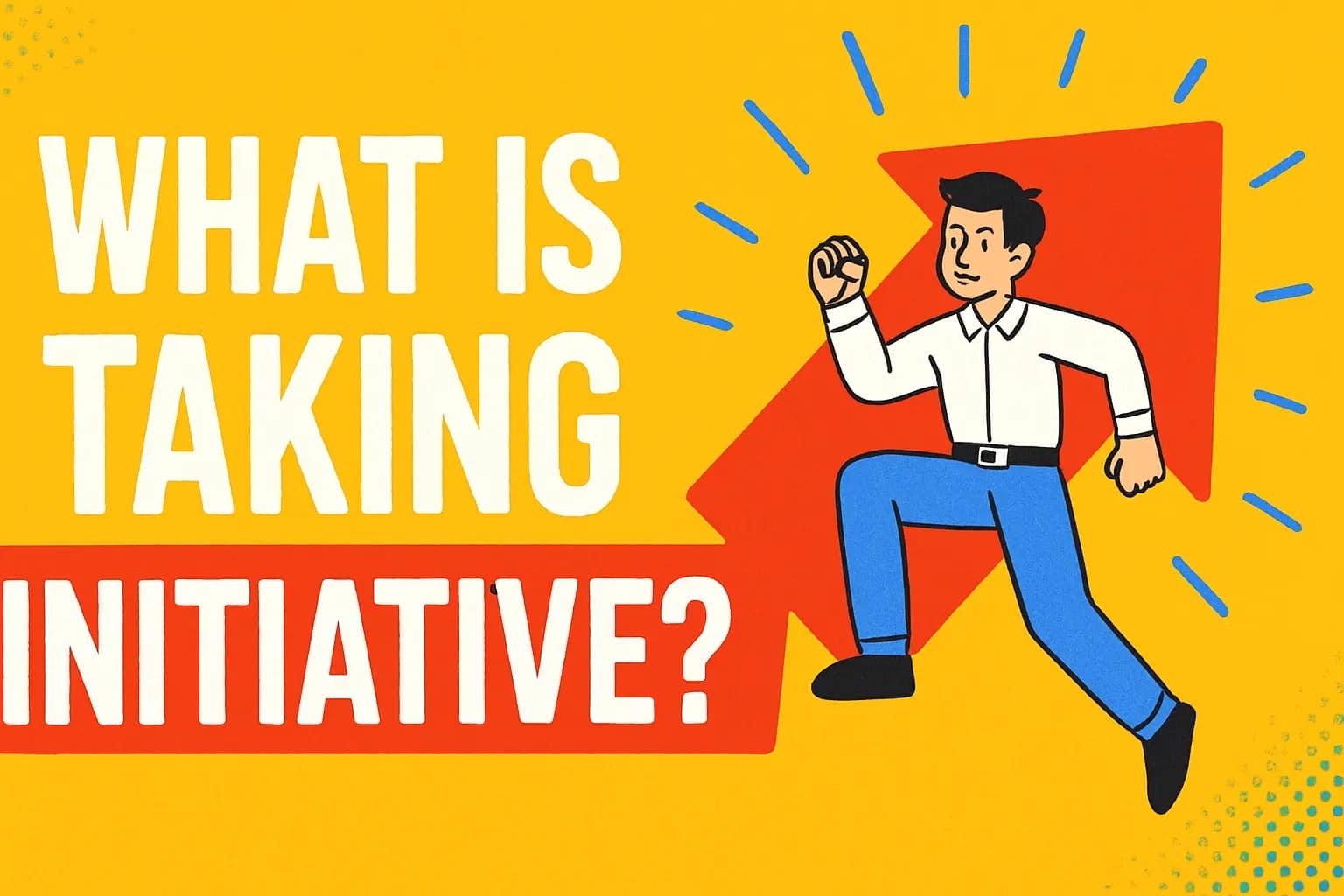What does taking initiative mean, and why does it matter so much? According to LinkedIn’s 2023 Workplace Learning Report, 86% of employers rank initiative and self-motivation as the top qualities they look for in candidates.
The willingness to take initiative is a powerful soft skill. But let’s be honest—why is it so hard to consistently step up, speak out, and take action without being told? Maybe you are a college student eager to stand out. Or, you are a new hire hoping to make a real impact from day one. Perhaps you are tired of playing small and ready to start taking charge of your success.

If that sounds like you, you are in the right place. In this article, we will uncover exactly how to build a proactive mindset and develop the habit of taking initiative so you can rise above the crowd and create meaningful change in your life and work.
Let’s dive in.
What is taking initiative?
Taking out the trash before your parents ask. Getting gas before your tank gets too low. Stopping at the gas station after noticing a low gas tank. Alerting a busy stranger who just dropped their wallet.
These everyday moments are simple yet powerful examples of what it means to take initiative.
While the definition can vary depending on the person or workplace, taking initiative typically means being the one to act first. It is about being mindful of your responsibilities and doing what’s necessary without waiting for someone else to prompt you.

Taking initiative involves solving problems early on before they become major or completing tasks before they are assigned. It also means taking responsibility for your actions and outcomes, even when nobody is watching.
So, what does proactivity look like in real life? Here are a few examples:
- Volunteering to lead a project when no one else raises their hand
- Learning a new skill to support yourself and your peers
- Following up with a colleague to make sure a task gets completed
- Planning to avoid potential issues before they emerge
Taking initiative is not just about being helpful; it is a foundational soft skill that strengthens other skills, such as time management, leadership, problem-solving, and communication.
And yet, many people hesitate to take initiative. Why is that? Let’s explore the reasons and how you can break through the hesitation and lead with action.
What stops people from taking initiative?
Some people love being in the spotlight—others, not so much. And that hesitation to be seen or noticed is just one of the many reasons why people might shy away from taking initiative.

Here are a few common reasons why some individuals hesitate to step up:
- Lack of confidence – They do not believe they are capable of going above and beyond, so they hold themselves back.
- Fear of failure – They are worried about making mistakes, being judged, or facing criticism.
- Overthinking – They get stuck in their heads, overanalyzing every possibility until they feel paralyzed.
- Burnout or low energy – They are physically or mentally drained and do not feel like they can give more than what is required.
- Fear of standing out – They worry about being seen as someone who is “trying too hard” and would blend in rather than take the lead.
Because of these obstacles, the act of taking initiative is interpreted in two very different ways:
- To some, it is a sign of leadership and drive.
- To others, it feels risky, like stepping outside of the unspoken rules of staying in your lane.
But here is the truth: taking initiative does not make you “too much”—it makes you intentional. And learning to push past these limiting beliefs can open the door to confidence, growth, and new opportunities.
How to start cultivating a proactive mindset
Taking initiative matters. Whether at work, in school, or in your personal life, it signals confidence, problem-solving ability, and adaptability. But let’s be real—developing this skill isn’t always easy, especially when fear, self-doubt, or burnout get in the way.
Building the habit of taking initiative begins with self-awareness, not just of your thoughts and emotions but also of what’s happening around you. It means tuning into your environment, understanding what has to get done, and having the courage to step up, even when no one asks you to.
Here are some simple but powerful ways to build your initiative muscle:
1. Identify current or future problems
Psychologist and researcher Dr. Tasha Eurich found that 95% of people believe they are self-aware, but in reality, only 10–15% are aware.
That gap says a lot. It suggests that many of us are not as in tune with ourselves, our surroundings, or others as we think we are. Self-awareness is not just a “nice-to-have” trait; it is a survival tool. Think back to our ancestors who had to hunt for food and stay vigilant—being aware of their environment was a matter of life or death.

In today’s society, self-awareness is crucial for recognizing and addressing problems. The best place to start? Becoming aware of the current and future challenges in your life.
Even if you feel like you are not facing any issues right now (which is rarely true), there are always potential problems waiting around the corner. By identifying them early, you give yourself a head start—and that is how you take initiative.
Start by reflecting on what has been frustrating you lately.
- What has been bothering you at work, school, and in your relationships?
- Are there small things that keep piling up?
- Are you avoiding something?
Once you have pinpointed these areas, you can apply your problem-solving skills to take action before the problems become even more substantial.
Awareness is the first step. Action is the next.
2. Identify people who might be struggling
An important aspect of self-awareness is recognizing when those around you may be struggling. By paying attention to the needs of others, you can step in and offer support, perhaps by volunteering to take on additional responsibilities. Doing so not only demonstrates kindness but also highlights your willingness to take initiative.
Whether you are at work, school, or home, start observing the people in your life—siblings, friends, parents, or coworkers—and consider whether they might be facing challenges. Once you have identified an area where they need help, think of practical ways you can step in. Even small actions can make a meaningful difference.

Of course, it is essential to help from a place of stability, meaning you are not pouring from an empty cup. But the more you offer support without expecting anything in return, the more natural it becomes. Over time, you will develop a habit of taking initiative, and it feels automatic. You will begin to notice problems before they arise and think ahead in ways others may not, simply because you have trained yourself to be attentive and proactive.
3. Identify your flaws and weaknesses
In psychology, willful ignorance refers to the deliberate avoidance of information that might expose flaws, weaknesses, or problems with one’s actions.
A study conducted by Jason Dana in 2007 explored altruistic behavior through a simple economic game. Participants had the choice between a $5 or $6 payout. Choosing $5 meant the recipient would also receive $5 while choosing $6 meant the recipient would only get $1. Surprisingly, the study found that 40% of people chose to remain unaware of the consequences, avoiding information that could influence their decision. This tendency to ignore uncomfortable truths reflects a deeper behavioral pattern.

Based on this, we can infer that many of us avoid confronting the hard truths in our lives. Rather than facing our problems head-on, we pretend they do not exist—creating the illusion that we are flawless. This mindset prevents growth. When we refuse to acknowledge our shortcomings, we miss opportunities to learn from failure and remain stuck in complacency.
Overcoming this requires mental toughness. It means putting our ego aside and having the courage to admit we are flawed. But the more we do this, the more self-aware we become—and that self-awareness is the first step to real personal growth.
To build the habit of taking initiative, we must bring what is hidden in the dark into the light. That means recognizing our insecurities, weaknesses, and blind spots. Once acknowledged, we can begin creating a plan to overcome them. This act of self-examination is a powerful form of proactivity and shows we are willing to take responsibility for our growth without needing someone else to point it out.
4. Try to do more than what’s required
In a world where comfort often becomes our most significant obstacle and doing the bare minimum is considered “good enough,” many people avoid going the extra mile simply because they do not see the need. But choosing to go above and beyond—even when it is not required—reflects more than just commitment; it shows initiative and ownership.
Taking extra steps demonstrates that you care not just about your performance but about the success of your team or organization. It reveals passion, self-motivation, and a willingness to go above expectations. While it is easy to adopt the mindset that you should not do anything unless it is asked of you, those who consistently take initiative often stand out and are rewarded in the long run.

Of course, stepping up requires self-motivation. You must be willing to challenge yourself, take on added responsibilities, and step outside your comfort zone. One effective way to start building this habit is through goal setting. Begin with small, manageable goals, such as committing to finish an optional task by a certain deadline. As you consistently follow through, you start to develop a rhythm. These small wins reinforce the habit of exceeding expectations and make proactivity second nature.
Over time, what once felt like “extra” effort becomes your new standard, and that is where growth truly begins.
5. Take accountability for your actions and outcomes
Think about the current stage of life you are in. Maybe you are a college student figuring out what to do or a working professional building your career. Now pause and reflect on the actions, choices, and habits that brought you to this exact point. As difficult as it might sound, you must accept the reality: you are where you are today because of your actions.
Yes, there may have been environmental factors and circumstances out of your control. But ultimately, the habits you have formed and the decisions you have made over time have shaped your present.

When you take full accountability—for both the good and the bad—you demonstrate initiative. You take ownership not just of your success but also of your setbacks. That takes leadership. You are stepping into the role of leading yourself, which is the first step in becoming capable of leading others.
The more you practice accountability, the more you strengthen the habit of taking initiative. You train your brain to stop placing blame and start solving problems. You become the kind of person who sees challenges and immediately begins to think, “What can I do to change this?”
That’s the beginning of real growth. That’s the mindset that transforms lives.
6. Shift from reaction to intention
Taking initiative isn’t about being the first to react—it’s about being the first to act. Sure, it’s critical to assess a situation before diving in, but it’s even more important not to get stuck in your head. As stated previously, one of the most significant obstacles stopping you from taking initiative is overthinking.
The more you overthink, the longer you wait, and the less likely you are to take any action at all.
Those who consistently take initiative aren’t waiting for the perfect moment to arrive. They are self-starters. They create their opportunities by moving forward with clarity, confidence, and courage, even if the outcome is uncertain.

Even when challenges are out of your control, you can still control your response. By focusing on action instead of circumstances, you train your mind to think proactively. That shift from passive to proactive builds your initiative muscle.
While others are stuck wondering what went wrong, you’re already 10 steps ahead, thinking about how to make things right.
7. Don’t be afraid to ask questions
One of the most overlooked habits when it comes to taking initiative is asking questions. Many of us hesitate to ask because we are afraid of looking unprepared, being judged, or admitting we do not know something. However, the truth is that asking questions is a powerful sign of leadership, curiosity, and drive.
In the workplace, asking thoughtful questions helps you make better decisions. It shows that you are engaged, eager to learn, and not afraid to seek clarity—qualities that employers value deeply. It also signals curiosity and enthusiasm, two traits that naturally set you apart in any environment.

Outside of work, asking questions—both to yourself and others—leads to deeper learning. It forces your brain to stay active, encourages critical thinking, and helps you understand new material more thoroughly. You are not just memorizing; you are processing, analyzing, and applying.
If you want to build a mindset that takes initiative regularly, start with this habit: Ask more questions.
Ask yourself:
- Do I fully understand this?
- What steps do I need to take to complete this task on my own?
- What’s something I can do right now to make progress?
The more you ask, the more you learn. And the more you learn, the more confident and proactive you become.
8. Take smart, calculated risks
The act of taking initiative is often about stepping into the unknown—you do not always know how things will turn out, and that is what makes it powerful. It means choosing to act even when you are unsure of the outcome. Sure, there is a chance of criticism or failure, but there is also an opportunity for growth, progress, and impact.
Instead of asking, “What’s the worst that could happen?” start asking, “What’s the best that could happen?” That minor shift can inspire you to take action. It changes your focus from fear to possibility—and that possibility is what drives meaningful action.

Now, that does not mean taking reckless risks. Taking the initiative is not about gambling; it is about making calculated moves with intention and awareness.
For example, if you are considering quitting your job to pursue a business full-time, do not act purely on emotion. Ask yourself:
- Have I tested the waters enough to validate this decision?
- Do I have enough savings to sustain myself?
- Is my business bringing in consistent income?
These are calculated risks. They require thought, planning, and responsibility, but they also show courage and initiative. You are not waiting for perfect conditions. You are evaluating the situation, preparing for it, and then taking the first step anyway.
Every time you take a smart risk, you build confidence. You stretch your limits. You prove to yourself that you can handle uncertainty. And eventually, when you take the initiative, it will start to feel natural and less risky.
Conclusion
Choosing to take the initiative comes with both pros and cons. On one hand, it’s a sought-after quality—people notice when you’re willing to do what others won’t. On the other hand, it often means stepping outside your comfort zone.
At its core, taking initiative is about doing more than expected. It’s about acting without needing permission or direction. And it all begins with one thing: self-awareness.
Ask yourself:
- What can I do now to make things easier for myself later?
- Who around me is struggling, and how can I support them without compromising my well-being?
- What are my weaknesses, and how can I work on them?
In the end, taking initiative isn’t about being perfect; it’s about being willing. Willing to act, to grow, and to be the kind of person who moves forward when others wait. That’s how you stand out—and that’s how you create real change in your life.
How do you plan on taking initiative moving forward today?

